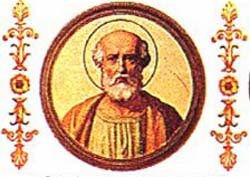 |
The Saint of the Day
Pope St. Innocent I – July 28
Prof. Plinio Corrêa de Oliveira
Biographical selection:

Pope St. Innocent I
|
St. Innocent I, a native of Albano, Italy, reigned from 401 to 417. This energetic Pope is known for his zealous welfare for the entire Church. His decrees became law in Spain, Gaul and Italy. He demanded that the Eastern Bishops re-install St. John Chrysostom, Bishop of Constantinople, who had been unjustly deposed. He censured the Bishop of Jerusalem for his negligence. He ratified the condemnation of the Pelagian Bishops of Africa who denied the need of grace for salvation.
In 410, during his pontificate, Rome was ravaged by the barbarians of Alaric. He took the responsibility of rebuilding the city and showed great charity in helping the victims.
Comments of Prof. Plinio:
St. Innocent is one of the greatest Popes of the 5th century. It is beautiful to see how he was entirely faithful amidst a hard struggle in a tragic era.
He lived at the time of the fall of the Western Roman Empire, when it seemed as if a multitude of accumulated chastisements fell over the Empire all at once. Historians do not sufficiently emphasize the simultaneous development of two major things at that time. The first, the invasion of the barbarians touched the temporal order, and indirectly shook the Church as well, since those barbarians were either pagans or heretics. The second, various heresies burst out everywhere when the Church emerged from the catacombs. Therefore, the Church faced attacks equal to, or even worse than, those which chastised the State.
However, the two institutions, the Church and the State, had different destinies. While the putrid Roman State disappeared, the Church produced great Popes, not ecumenical Popes but rather warrior Pontiffs who relentlessly fought against the heresies, making continuous excommunications and wounding the enemies of the Church as much as they could.

Pope Innocent I faced the sack of Rome by Alaric in 410
|
The Roman Emperors adopted a pacifist policy, permitting the barbarians to cross the military posts of the Empire that had been constructed near the natural barriers of the Rhine and Danube rivers. After crossing those lines, the barbarians were allowed to remain inside the Empire and settle land there. Once the Empire’s army became accustomed to their presence and let down its guard, the barbarians started their invasions from within.
On the contrary, the great Popes of those times did not take a pacifist attitude. They energetically fought the enemies of the Church and strongly defended the doctrine of Our Lord Jesus Christ.
The result of these two opposite policies is that the Western Roman Empire ended, while the Church - led by Popes like St. Innocent - rose to a most glorious destiny. Those Popes were the first great men who constituted the foundation for the Middle Ages.
These considerations show us how that energetic policy of the Popes to resolve the problems of the Church and defend the truth is the correct one.
Let us pray to Pope St. Innocent I to give us energy like his to defend the cause of the Catholic Church in these days of abomination in which we live, even if the example we receive from high places is the opposite.


  | | Prof. Plinio Corrêa de Oliveira | |
The Saint of the Day features highlights from the lives of saints based on comments made by the late Prof. Plinio Corrêa de Oliveira. Following the example of St. John Bosco who used to make similar talks for the boys of his College, each evening it was Prof. Plinio’s custom to make a short commentary on the lives of the next day’s saint in a meeting for youth in order to encourage them in the practice of virtue and love for the Catholic Church. TIA thought that its readers could profit from these valuable commentaries.
The texts of both the biographical data and the comments come from personal notes taken by Atila S. Guimarães from 1964 to 1995. Given the fact that the source is a personal notebook, it is possible that at times the biographic notes transcribed here will not rigorously follow the original text read by Prof. Plinio. The commentaries have also been adapted and translated for TIA’s site.
|
Saint of the Day | Home | Books | CDs | Search | Contact Us | Donate

© 2002- Tradition in Action, Inc. All Rights Reserved
|
 |

|